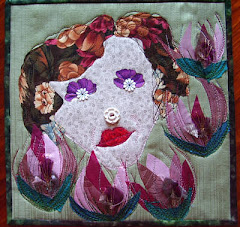I recently came across a commencement address given by Paula Jorde Bloom at Louis University in the US. It resonated with me for a couple of reasons, firstly because it encompasses much of the discussion I see on Art Quilt discussion groups about developing oneself and one's art and secondly because in viewing my life in retrospect I realise that the times I learnt the most have always been the times when I was furthest from my comfort zone. If this extract resonates with you as well, you can read the full address here
".... we acquire wisdom by affirming our ignorance. You know, all our adult lives we strive to become knowledgeable, competent, and skilled in our professional practice. We pat ourselves on the back every time we achieve a new credential, certificate, or degree. We applaud our achievements as though filling up the shopping cart of our accomplishments is the mark of an educated mind. The irony is that true wisdom comes from the admission of our ignorance, from being open to discovering just how much we don’t know, how much we still need to learn....
"I believe the most vibrant people I’ve met in my life hold a transformational view of human growth and change. They see themselves as active agents in describing, interpreting, and shaping their behavior. In other words, they are self-mentors. The great Roman philosopher Cicero is credited with saying, 'No one can give you better advice than yourself.' Well, that is the essence of being a self-mentor. Self-mentoring means taking stock of the parts of yourself you relish and want to preserve as well as those you’d like to change or toss out the window. It is a conscious commitment to move toward personal excellence by celebrating ignorance....
"Being a self-mentor rests squarely on our ability to be reflective and be self-aware. It means knowing our needs and values, our strengths and limitations, our passions, and our idiosyncratic quirks. It means having a deep appreciation of what makes each of us a unique specimen on this planet. On a deeper level, it means knowing how we react in different situations and accepting full responsibility for our feelings and actions.
"Being a self-mentor is difficult because it involves an ongoing assessment of our assumptions, beliefs, and values, and the mental models that shape our behavior and guide our actions. It also means having a clear picture of our internal motives — those things that drive us to say what we say and do what we do. Peeling away the layers of our motivations is not always a comfortable process, but it is necessary if our goal is to become a person known for personal integrity."
View From My Back Deck
5 days ago

1 comment:
I wouldn't have it any other way...
Post a Comment